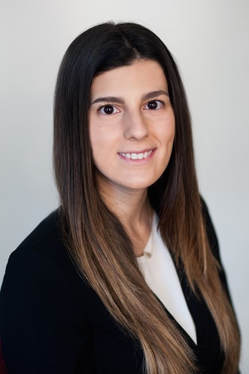Graduate Archer Fellowship Program Alumni Profiles

Ruba Alafifi
Summer 2015 Archer Fellow
Internship: U.S. Department of Health and Human Services, Office of Global Affairs
Education
The University of Texas at Austin
B.S. Human Development and Family Sciences; May 2013
The University of Texas at Southwestern Medical Center
M.D. and M.P.H.; Exp. May 2019
Summer 2015 Archer Fellow
Internship: U.S. Department of Health and Human Services, Office of Global Affairs
Education
The University of Texas at Austin
B.S. Human Development and Family Sciences; May 2013
The University of Texas at Southwestern Medical Center
M.D. and M.P.H.; Exp. May 2019
“It solidified my goal to be involved in policymaking as a physician so that I can help shape the changes that effect on-the-ground clinical work every day. I believe that physician involvement in politics is essential to creating realistic, effective, and long-term improvements.
Q & A with Ruba
Please tell us more about your current position.
Current student.
What has been your general career path?
My general career path has been to pursue medicine and public health, with the ultimate goal of being an Obstetrician/Gynecologist who is also involved in healthcare policy and global medicine.
How has being an Archer Fellow influenced your professional path and goals?
Being an Archer Fellow helped me better envision how my career will merge my passions for public policy, women's health, global health, and clinical medicine. It solidified my goal to be involved in policymaking as a physician so that I can help shape the changes that effect on-the-ground clinical work every day. I believe that physician involvement in politics is essential to creating realistic, effective, and long-term improvements to our healthcare system.
What do you value the most about your experience as an Archer Fellow?
I value most that I had the opportunity to work for a government agency in a field that I am passionate about. It helped me understand what "politics" actually are rather than it just being an idea. This has shaped my career goals, solidifying my goal to be involved in healthcare policy as a future physician.
What was the most important thing you learned as an Archer Fellow?
Networking. I think that this term can be intimidating, but being an Archer Fellow pushed me out of my comfort zone and helped me develop networking skills that I now enjoy and use regularly.
What do you value the most about being an Archer Alumna?
I value most the connections and relationships that I built during my time in D.C., some of whom are now my best friends. I also value having access to a broad network of talented individuals with diverse backgrounds.
What is your favorite memory from the program?
It might sound silly, but my favorite memory is coming home and watching "Bones" with my many roommates. At some point, the show was just playing constantly while we cooked, cleaned, talked, or napped. It became a sort of ritual. Having that sense of community on a daily basis was special.
Do you have advice for prospective students?
Do it! There is a niche for everyone and the skills you develop will be invaluable. We were such a diverse group, and politics includes so many disciplines that everyone can get involved. Also, do not be intimidated if you do not have a "background" in policy because the program is really built for individuals with all kinds of interests and skills.
Please tell us more about your current position.
Current student.
What has been your general career path?
My general career path has been to pursue medicine and public health, with the ultimate goal of being an Obstetrician/Gynecologist who is also involved in healthcare policy and global medicine.
How has being an Archer Fellow influenced your professional path and goals?
Being an Archer Fellow helped me better envision how my career will merge my passions for public policy, women's health, global health, and clinical medicine. It solidified my goal to be involved in policymaking as a physician so that I can help shape the changes that effect on-the-ground clinical work every day. I believe that physician involvement in politics is essential to creating realistic, effective, and long-term improvements to our healthcare system.
What do you value the most about your experience as an Archer Fellow?
I value most that I had the opportunity to work for a government agency in a field that I am passionate about. It helped me understand what "politics" actually are rather than it just being an idea. This has shaped my career goals, solidifying my goal to be involved in healthcare policy as a future physician.
What was the most important thing you learned as an Archer Fellow?
Networking. I think that this term can be intimidating, but being an Archer Fellow pushed me out of my comfort zone and helped me develop networking skills that I now enjoy and use regularly.
What do you value the most about being an Archer Alumna?
I value most the connections and relationships that I built during my time in D.C., some of whom are now my best friends. I also value having access to a broad network of talented individuals with diverse backgrounds.
What is your favorite memory from the program?
It might sound silly, but my favorite memory is coming home and watching "Bones" with my many roommates. At some point, the show was just playing constantly while we cooked, cleaned, talked, or napped. It became a sort of ritual. Having that sense of community on a daily basis was special.
Do you have advice for prospective students?
Do it! There is a niche for everyone and the skills you develop will be invaluable. We were such a diverse group, and politics includes so many disciplines that everyone can get involved. Also, do not be intimidated if you do not have a "background" in policy because the program is really built for individuals with all kinds of interests and skills.

